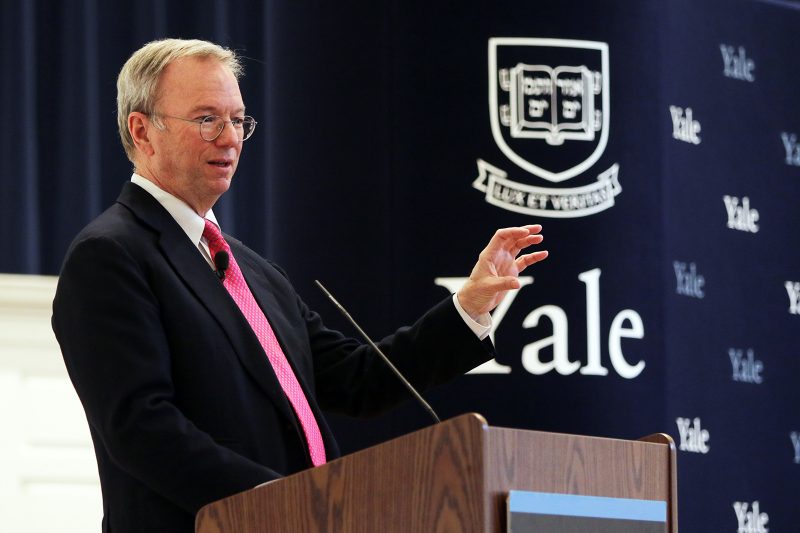Most companies are not very well prepared for the weaponizing of cyberspace by foreign governments.
That was part of an assessment of the current state of cyberspace by Eric Schmidt, former chairman of Alphabet, Inc. and CEO of Google. Schmidt gave the remarks during his keynote address at the two-day annual conference of the Yale Johnson Center for the Study of American Diplomacy, which kicked off on April 6. This year’s conference, “Understanding Cyberwarfare and Artificial Intelligence,” drew both academics and practitioners.
This was the seventh annual conference of the Johnson Center, which was made possible by Dr. Henry Kissinger’s donation of his papers to Yale and a generous gift from Charles B. Johnson ’54 and Nicholas F. Brady ’52. As a program of the Jackson Institute for Global Affairs, and in collaboration with International Security Studies and the Brady-Johnson Program in Grand Strategy, the Johnson Center brings prominent statesmen and academics to campus as Kissinger Senior Fellows and Kissinger Visiting Scholars, as well as hosting an annual conference and a variety of other events relating to international affairs.
Following Schmidt’s remarks—during which he outlined several hypothetical examples of both positive and negative applications of artificial intelligence (AI)—Dr. Henry Kissinger offered his reflections. Kissinger, whose seminar work Nuclear Weapons and Foreign Policy examined the relationship between technology and strategy in the nuclear age, gave a historical perspective on the current state of affairs.
Schmidt and Kissinger also discussed the ethical dimensions of AI and took questions from the audience on topics ranging from the Russian cyber influence campaign leading up to the 2016 U.S. election, “killer robots,” and China’s national plan for AI.
“AI is much more complicated than nuclear arms control,” Kissinger observed. In the Cold War, “we had good estimates of Russia’s capabilities. With cyber weapons, it’s different. Not every country admits to using them,” he said.
The second panel addressed cybersecurity leadership and strategy from the perspective of the Department of Defense. The Honorable Ashton Carter, a Yale alumnus and the former Secretary of Defense and Director, Belfer Center for Science and International Affairs, Harvard Kennedy School, said that strategy and dialogue are uniquely difficult when it comes to dealing with Russia.
“Putin’s goal is to thwart U.S. interests,” Carter said. “It’s hard to build bridges when that is the goal.”
Carter, along with moderator John Gaddis, the Robert A. Lovett Professor of Military and Naval History at Yale, also fielded wide-ranging questions from the audience.
The conference continued on Saturday with more focused panel discussions. Speakers and panels included:
Cybersecurity and Cyberwarfare: Understanding the Threat Landscape
- Nuno Monteiro, Associate Professor of Political Science and Director, International Security Studies, Yale University
- Jared Cohen, Founder and President, Jigsaw
- Gen. William Mayville, Vice Commander, U.S. Cyber Command
- Matthew Olsen, Co-Founder and President, IronNet Cybersecurity; former Director of the National Counterterrorism Center
- Thomas Rid, Professor of Strategic Studies, Johns Hopkins School of Advanced International Studies
Artificial Intelligence and Global Security: Risks, Governance, and Alternative Futures
- Allan Dafoe, Assistant Professor of Political Science, Yale University; Director, Governance of AI Program, Future of Humanity Institute, University of Oxford
- Dario Amodei, Research Scientist and Team Lead for Safety, OpenAI
- Jason Matheny, Director, Intelligence Advanced Research Projects Agency
- The Honorable Robert Work, former Acting and Deputy Secretary of Defense; Senior Counselor for Defense, Center for a New American Security
